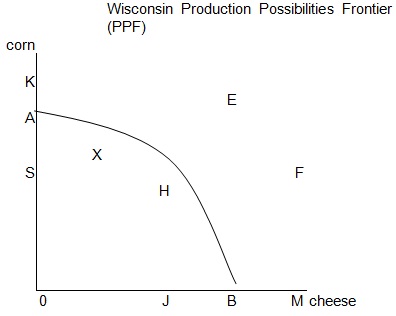Part I.
Question 1. Use the production possibility frontier (the curve joining points A and B) shown below to answer question one.

a) Are there any non-feasible production points? If so, what are they and why are they non-feasible?
b) Given the current PPF (the curve joining points A and B) would Wisconsin choose to produce at point H? Why or why not?
c) Given the graph above, Wisconsin's opportunity cost of producing more cheese in terms of corn changes in what way as we move from point A to B? Give the definition of the law this illustrates.
d) Suppose Wisconsin experiences a long-term water drought that reduces its ability to produce all agricultural goods. The new Wisconsin production possibility frontier will most closely resemble a curve joining which two letters?
e) Suppose a new hormone is invented which allows cows to greatly increase their milk production and therefore cheese production in Wisconsin increases dramatically. Assuming the PPF is originally the curve joining points A and B, the new Wisconsin PPF will most closely resemble a curve connecting which two points?
Question 2. Last weekend your roommate told you "If I didn't have a date tonight I would save 30 dollars and watch the Party of Five/Ally McBeal reruns on TV". Define opportunity cost. What is your roommate's opportunity cost of his date?
Question 3. When the price of good K is $13, two units are demanded. When the price of good K is $1, twenty-six units are demanded. Assume the straight line connecting these two points represents the demand curve for good K.
a) What is the slope of this line? (price is represented on the vertical axis, quantity is represented on the horizontal axis) Does the sign of the slope make sense? Explain why you would expect it to be either positive or negative.
b) Graph this line, labeling the axes.
c) What is the quantity demanded if the price of good K is $8?
Question 4. Dawson and Buffy live on the Isle of BadTV. The only two activities they do are to gather stakes and fish in the creek. No inputs other than time are used. During the course of an hour Dawson can retrieve nine stakes or catch three fish. Buffy on the other hand can retrieve either ten stakes or catch five fish in an hour.
a) What is Dawson's opportunity cost for gathering one stake? One fish?
b) What is Buffy's opportunity cost for gathering one stake? One fish?
c) Who has the comparative advantage in stakes? In fish?
d) Does anyone have an absolute advantage? Why or why not?
e) Can Dawson and Buffy benefit from specialization? If so, how?
Part II.
Read an article from an economic or financial publication that has relevance for what we are learning in this class. The "accepted" list of publications is Wall Street Journal, Financial Times, The Economist, Barron's, and Business Week. Obviously, this list is not intended to be comprehensive. If you find a good and interesting article in any publication, printed or on the Internet, you are invited to read it.
Write a one page (single spaced, font 10) review of the article you just read. Attach a copy of the original article.
Your review will be graded according to its relevance for this class, the ideas you put forward, and your knowledge of written English.